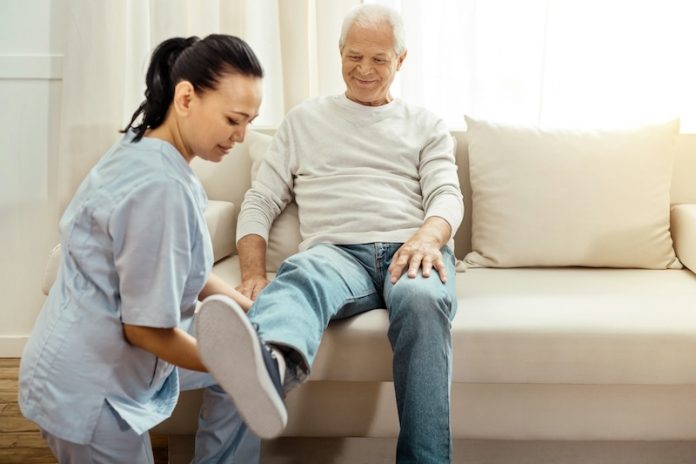
Osteoporosis is a common bone disease that affects millions of people worldwide. It makes bones weak and more likely to break, even from small falls or minor injuries.
The word “osteoporosis” actually means “porous bones,” which describes how the bones become less dense and more fragile over time. When bones lose mass and strength, they become more brittle and are at a higher risk of fractures.
Our bones are living tissues that are always being broken down and rebuilt. This process keeps them strong and healthy. However, as we get older, the balance between bone breakdown and bone building changes. More bone is lost than is created, leading to a gradual loss of bone density.
This is a natural part of aging, but it can be more severe for some people, especially women after menopause. This is because estrogen, a hormone that helps protect bone density, drops sharply after menopause. Without enough estrogen, bones lose density more quickly.
Genetics also play a major role in osteoporosis. If your parents or grandparents had weak bones or experienced fractures, you might be more likely to develop osteoporosis as well. Scientists are studying specific genes that affect bone health, hoping to find better ways to predict and prevent the disease.
Lifestyle choices are very important when it comes to bone health. Eating a diet rich in calcium and vitamin D is one of the best ways to keep bones strong. Calcium is a crucial building block for bones, while vitamin D helps your body absorb calcium.
Foods like dairy products, leafy green vegetables, and foods fortified with calcium are good choices. Vitamin D can also be obtained from sunlight exposure and foods like fatty fish, eggs, and fortified cereals.
Physical activity is another key factor. Weight-bearing exercises, such as walking, running, and weight lifting, help build and maintain bone density.
Research shows that people who stay active throughout their lives have stronger bones than those who do not exercise regularly. Regular exercise puts healthy stress on your bones, which helps them stay strong and reduces the risk of fractures.
On the other hand, certain habits can weaken bones. Smoking and drinking too much alcohol are both linked to lower bone density. Smoking interferes with the body’s ability to use calcium effectively, while alcohol can slow down bone formation and increase the risk of falls.
Some medications, particularly long-term use of steroids like prednisone, can also cause bone loss. If you are taking such medications, it’s important to talk to your doctor about how to protect your bone health.
Preventing osteoporosis is much easier than treating it after it develops. The best time to build strong bones is during childhood and early adulthood. However, it’s never too late to take steps to protect your bones.
Eating a diet rich in calcium and vitamin D, staying active, and avoiding smoking and heavy drinking can help maintain bone strength. For older adults, regular bone density tests can help detect osteoporosis before it leads to fractures. These tests are especially important for women over the age of 50 and men over the age of 70.
Scientists are always looking for better ways to treat and prevent osteoporosis. New treatments are being developed that aim to slow down bone loss or even help rebuild bone tissue. There is also growing interest in understanding how hormones like testosterone in men affect bone health, as this could lead to new treatment options.
In summary, osteoporosis is a condition where bones become weak and more likely to break. It is influenced by aging, genetics, hormone changes, and lifestyle choices. Understanding these risk factors is important for prevention. With the right diet, regular exercise, and healthy habits, you can reduce your risk of osteoporosis and keep your bones strong and healthy as you age.
Early detection through bone density tests can also help catch the disease before it becomes a serious problem. By taking steps to protect your bones now, you can enjoy better health and avoid the pain and disability that osteoporosis can cause.
If you care about arthritis, please read studies about extra virgin olive oil for arthritis, and pomegranate: A natural treatment for rheumatoid arthritis.
For more information about arthritis, please see recent studies about how to live pain-free with arthritis, and results showing medical cannabis may help reduce arthritis pain, back pain.
Copyright © 2025 Knowridge Science Report. All rights reserved.



